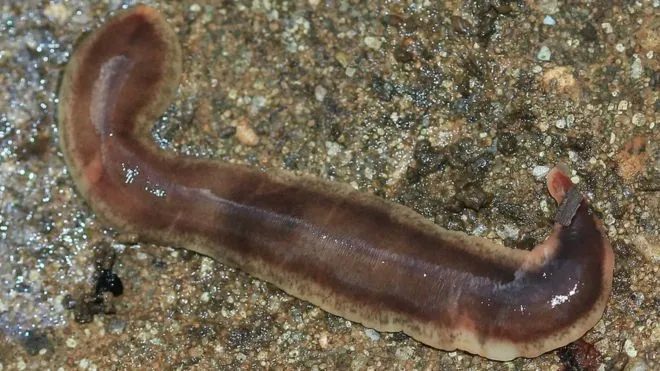A Platyhelminth (Flatworm) are invertebrates that can be found in saltwater, freshwater and on land. Considering how amazing this animal is, they look pretty simple. Some flatworms eats through its mouth obviously but once the food has been digestive anything left comes back out of the mouth. In short this animal doesn’t have an anus. Flatworms also can reproduce sexually and asexually which is done by splitting. A species called Planaria are hermaphrodites and possess both ovaries and testicles. These creatures are becoming more common in school biology and the most well-known flat worm is a tapeworm.
I’m a fan of flatworms because of their fascinating trait, which makes them stand out. These invertebrates have an amazing regenerating ability. At Nottingham University they cut one worm, into several different pieces and each section regenerated into a new worm. This experiment was done over four years, producing 20,000 flatworms. The worm was split horizontally and vertically but it didn’t matter, as each section would still grow into a worm.
In 1955 Robert Thompson and James V McConnell, experimented on planarian by shocking them and pairing the shocks with a light. They did this several times, before taking the shock away and leaving only the bright light. The worms would react to the light, as though it had been shocked. The invertebrates were then cut into two and they found both worms, would react to the light as a shocked. This experiment was to show that the memory could be transferred. In 2012 Tal Shomrat and Michael Levin showed that flatworms can retrieve long term memory, after regenerating a new head.
They have also been sent to space. Of course I have to mention space somehow; that's for another article though. We can learn so much from these worms, as they are biologically immortal like Turritopsis dohrnii. When we get cut, our cells divide to heal the injury; this can best be seen with skin. As the stem cells get older, they become less able to replace (divide) older cells. Planarian cells don’t go through this process and they can keep dividing. Learning more could have all sorts of medical breakthroughs. It won’t make us immortal but could help with diseases and wounds in the future.
Source
https://www.nationalgeographic.com/science/phenomena/2011/05/12/an-entire-flatworm-regenerated-from-a-single-adult-cell/
https://www.ncbi.nlm.nih.gov/pmc/articles/PMC5469732/
https://www.nottingham.ac.uk/news/pressreleases/2012/february/immortal-worms-defy-ageing.aspx
